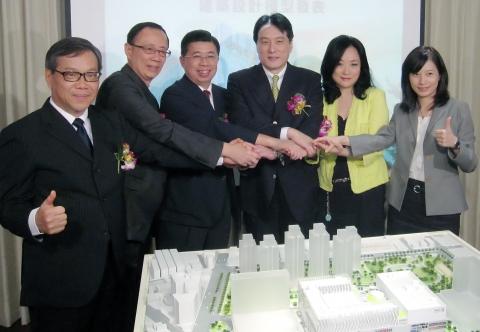Uni-President Enterprises Corp (統一企業) may see its second Dream Mall (夢時代購物中心) become the largest shopping mall in the Greater Tainan area by the end of 2014 and turn a profit in the first year of operation.
The launch of T.S. Dream Mall (南紡夢時代購物中心) — in collaboration with Tainan Spinning Co Ltd (台南紡織) — is expected to provide more than 5,000 job openings, company executives said. It is also to be the only 24-hour mall in the nation.
“After receiving the building permit on September 12, the mall is scheduled to begin operations in the fourth quarter of 2014,” Tainan Spinning vice chairman Hou Po-ming (侯博明) told a press conference in Taipei.

Photo: Yang Ya-min, Taipei Times
A total of 108 brand-name tenants have signed a letter of intent to have either a counter or a shop in the 8,000 ping (26,400m2) mall, which is designed for 380 tenants, Hou said.
Vieshow Cinemas (威秀影城) are set to operate eight screens in the mall, while New Palace International Co Ltd (新天地餐飲集團) — a listed catering group in the local bourse — is to offer wedding banquet services in its restaurants in the mall.
Uni-President president Alex Lo (羅智先) said the cost of constructing and recruiting shops for T.S. Dream Mall has been much lower than that for the first Dream Mall in Greater Kaohsiung, which opened in 2007, given the company’s experience and resources.
This will make it easier and faster for T.S. Dream Mall to generate income for the company, Lo said, adding that he expects the mall may turn a profit in the first year of operation.
T.S. Dream Mall is to be built and operated by a joint venture between Tainan Spinning and Tungcheng Development Corp (統正開發), a subsidiary of Uni-President, with each taking 50 percent stake.
The joint venture, and the 380 tenants, are expected to invest more than NT$10 billion (US$340.08 million) in the mall, the company said in a statement.
The mall, as well as a 14,700 ping park, will be the first phase of the joint venture’s three-phase development plan in the region, the statement said.
For the second and the third phase of the plan, the joint venture it to develop offices and high-level residential quarters in the mall’s neighborhood, with Hotel Royal Group (老爺大酒店集團) also set to launch a hotel in the region, the statement added.

SEMICONDUCTOR SERVICES: A company executive said that Taiwanese firms must think about how to participate in global supply chains and lift their competitiveness Taiwan Semiconductor Manufacturing Co (TSMC, 台積電) yesterday said it expects to launch its first multifunctional service center in Pingtung County in the middle of 2027, in a bid to foster a resilient high-tech facility construction ecosystem. TSMC broached the idea of creating a center two or three years ago when it started building new manufacturing capacity in the US and Japan, the company said. The center, dubbed an “ecosystem park,” would assist local manufacturing facility construction partners to upgrade their capabilities and secure more deals from other global chipmakers such as Intel Corp, Micron Technology Inc and Infineon Technologies AG, TSMC said. It

NO BREAKTHROUGH? More substantial ‘deliverables,’ such as tariff reductions, would likely be saved for a meeting between Trump and Xi later this year, a trade expert said China launched two probes targeting the US semiconductor sector on Saturday ahead of talks between the two nations in Spain this week on trade, national security and the ownership of social media platform TikTok. China’s Ministry of Commerce announced an anti-dumping investigation into certain analog integrated circuits (ICs) imported from the US. The investigation is to target some commodity interface ICs and gate driver ICs, which are commonly made by US companies such as Texas Instruments Inc and ON Semiconductor Corp. The ministry also announced an anti-discrimination probe into US measures against China’s chip sector. US measures such as export curbs and tariffs

The US on Friday penalized two Chinese firms that acquired US chipmaking equipment for China’s top chipmaker, Semiconductor Manufacturing International Corp (SMIC, 中芯國際), including them among 32 entities that were added to the US Department of Commerce’s restricted trade list, a US government posting showed. Twenty-three of the 32 are in China. GMC Semiconductor Technology (Wuxi) Co (吉姆西半導體科技) and Jicun Semiconductor Technology (Shanghai) Co (吉存半導體科技) were placed on the list, formally known as the Entity List, for acquiring equipment for SMIC Northern Integrated Circuit Manufacturing (Beijing) Corp (中芯北方積體電路) and Semiconductor Manufacturing International (Beijing) Corp (中芯北京), the US Federal Register posting said. The

India’s ban of online money-based games could drive addicts to unregulated apps and offshore platforms that pose new financial and social risks, fantasy-sports gaming experts say. Indian Prime Minister Narendra Modi’s government banned real-money online games late last month, citing financial losses and addiction, leading to a shutdown of many apps offering paid fantasy cricket, rummy and poker games. “Many will move to offshore platforms, because of the addictive nature — they will find alternate means to get that dopamine hit,” said Viren Hemrajani, a Mumbai-based fantasy cricket analyst. “It [also] leads to fraud and scams, because everything is now